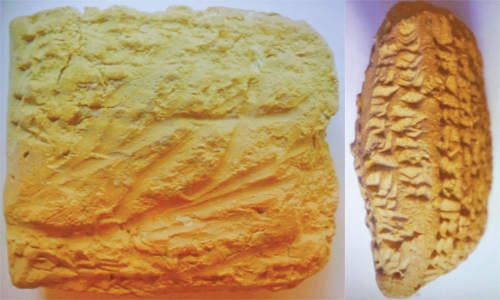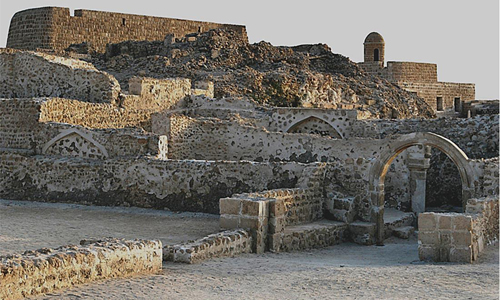Karbabad discoveries reveal first ever credit pact
Manama : A stone tablet found near Qal’at Al Bahrain archaeological site in Karbabad recently is reported to carry a loan agreement, which is said to be the first ever in the human history carved on stone.
Archaeologists say the stone tablet with the loan agreement was probably the first in history and was made between two individuals who lived on the island 2500 years ago.
The agreement, according to the archaeologists, was about one of them borrowing some dates from the other on the promise of returning one year later.
The tablet also carries the names of witnesses for the agreement, which according to the explorers, was a sign of the civilised behaviour prevailed in that age and which was rare in many parts of the world.
The stone is also the first to have cuneiform writings supposed to have its origin in the first millennium BC.
The stone tablet was, however, discovered by a team of international and local archaeology specialists under the Bahrain Authority for Culture and Tourism (BACA).
According to Archaeological Affairs Counsellor at BACA Dr Pierre Lombard, the carving dates back to around 503-04 BC.
Dr Lombard said this during a recent lecture at Bahrain National Museum to announce the new set of discoveries in Bahrain last year.
“The agreement carved on one side of the tablet shows it was written in 19th year of King Darius I, who ruled Babylon during the time (around 503-504 BC), in Akkadian language, used to be popular during the time,” he said.
He said that based on the inscription, it is assumed that the borrower had returned the dates next year during the month of Tashrit (September or October). And when it was returned, the names of the witnesses were scratched, and along with that the name where the agreement had taken place, too, he said.
“It could have been Qal’at Al Bahrain,” he added.
DT News had reported on Thursday that archaeological teams from Bahrain, France, Denmark and Japan had made five important discoveries in 2016.
The materials including the tablet, gold pieces, coffins and pottery crafts, aging thousands of years, were found at different parts of the island, proving the island had connections to ancient civilisations including Mesopotamia and the Greek.
Related Posts


